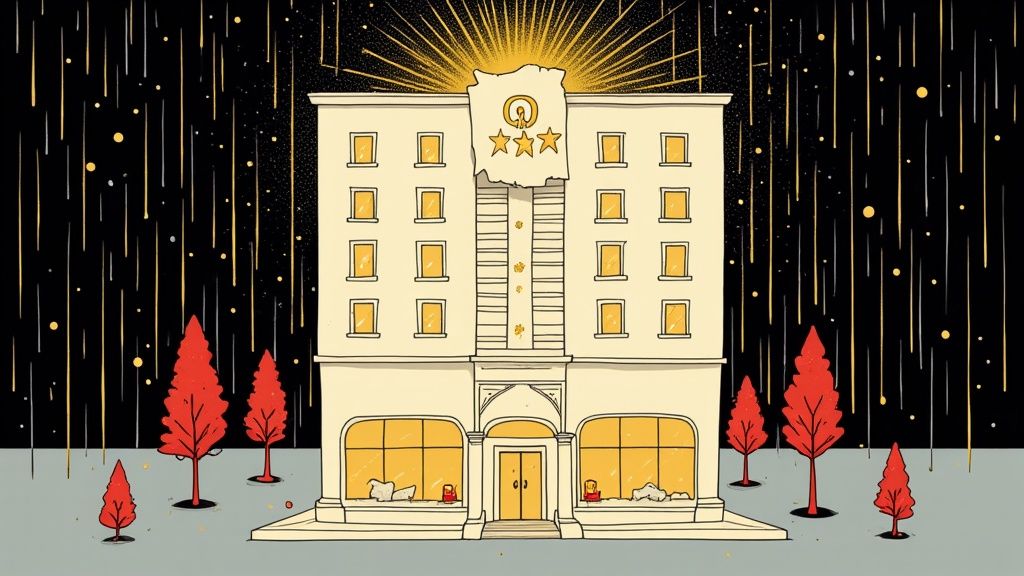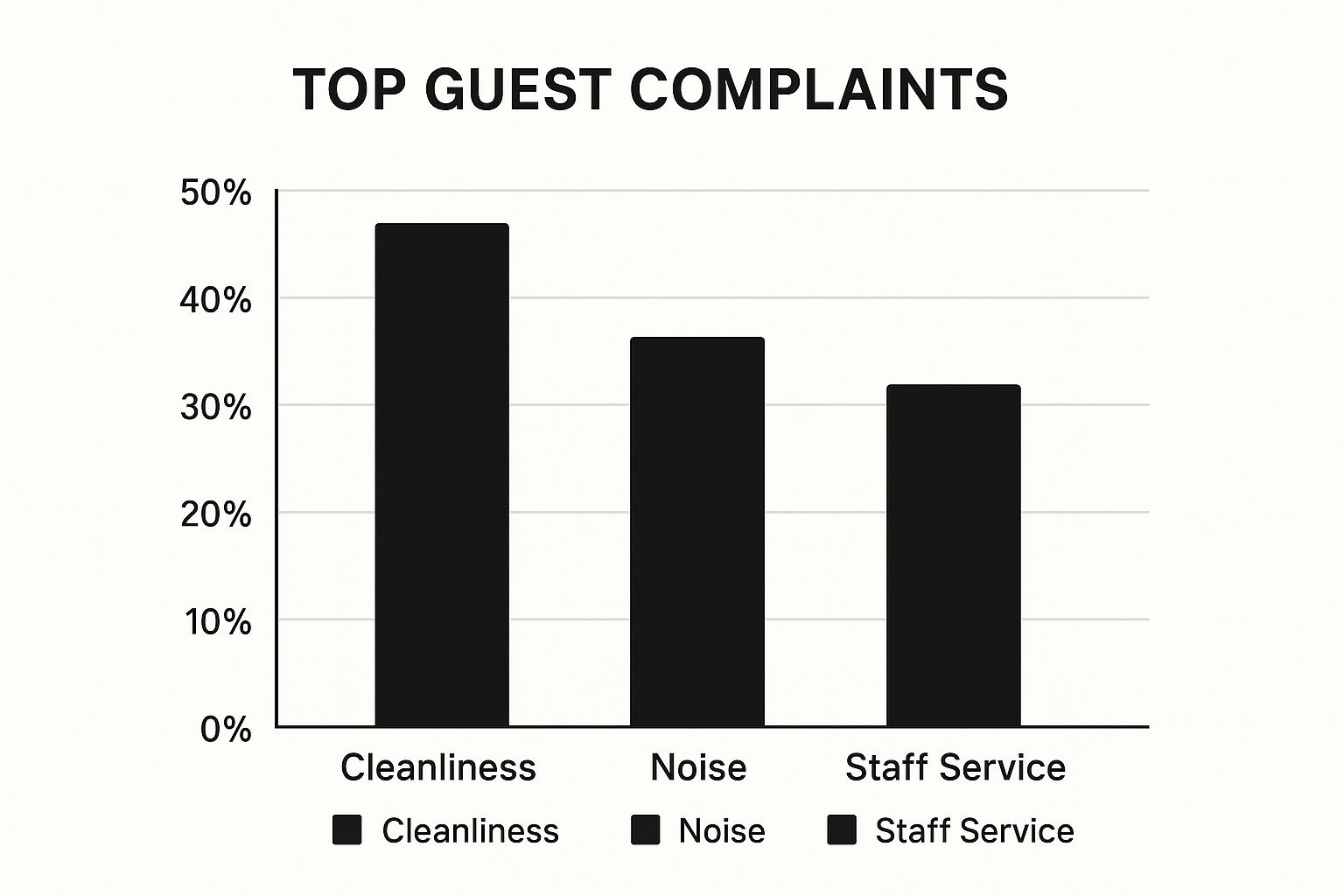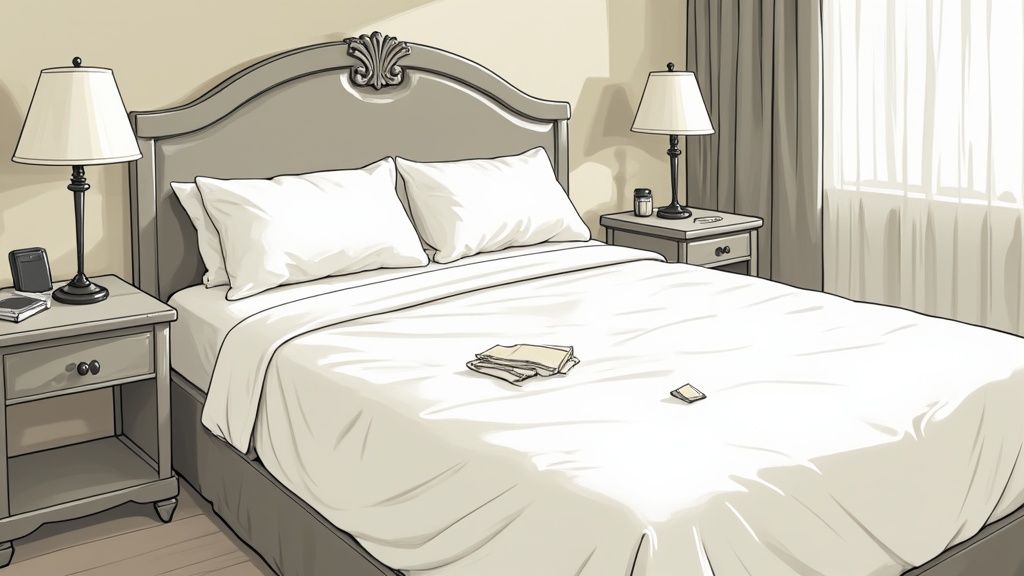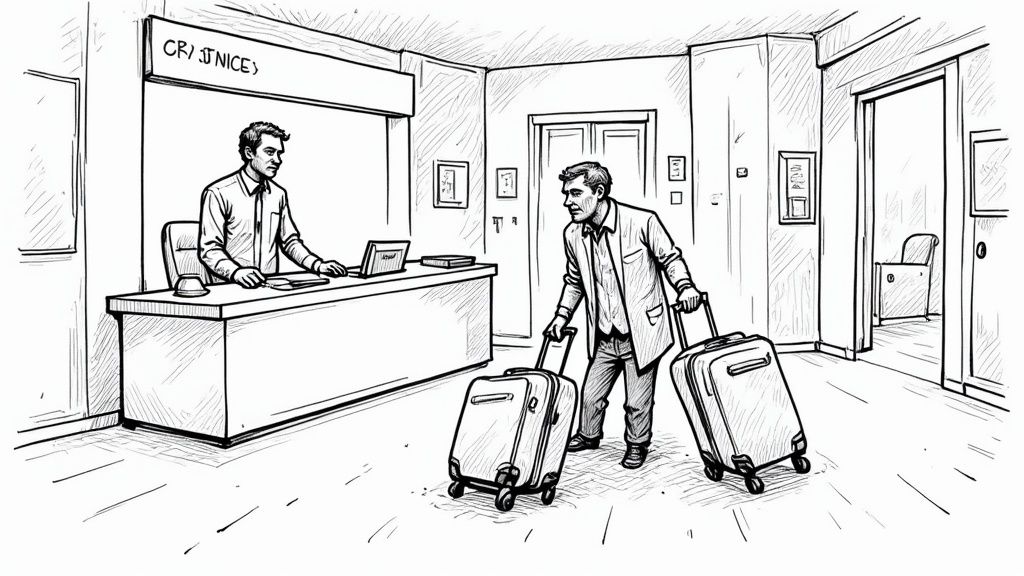Turning Negative into Gold Bad Hotel Reviews Guide
July 13, 2025

Let's be blunt: a bad hotel review isn't just an unhappy customer airing their grievances online. It's a direct shot at your hotel's reputation, and more importantly, its profitability. A single one-star comment can steer hundreds of potential guests away from your property before they even visit your website. This is why managing your online reputation has become a core business function, not just a task for the customer service team.
The True Cost of a Bad Hotel Review
Think of a bad review as a crack in your hotel's financial foundation. It’s easy to shrug off a single negative post as one person’s bad day, but the damage runs much deeper. These reviews create a ripple effect that spreads across every key performance indicator (KPI) that matters to your business, from your daily occupancy to your overall revenue.
This isn't just about a bruised ego or a slightly tarnished brand. The financial consequences are very real and measurable. When a traveler sees an unresolved complaint, they hesitate. That hesitation leads to fewer bookings, which means you're either staring at empty rooms or slashing your rates to compete—both of which eat directly into your profit margins.
Connecting Reviews to Revenue
The link between online reviews and your bottom line is crystal clear. Negative feedback has a direct, statistically proven impact on critical metrics like occupancy and revenue per available room (RevPAR). While the hotel industry is seeing some positive signs, like average 2024 occupancy rates hitting 66% and a projected 2% RevPAR growth in the U.S. for 2025, these gains are fragile.
With operational costs rising even faster, any revenue hit—especially one from something as preventable as a bad review—becomes a serious threat. You can dive deeper into these market trends by exploring the full 2025 global hotel outlook.
To get ahead of this, you need a plan. If you're ready to safeguard your hotel's revenue and build a stellar reputation, you can schedule a complimentary consultation to discuss a strategy tailored to your property.
This image highlights the most common guest complaints, giving you a clear roadmap of what to focus on.

As you can see, the data is overwhelming: cleanliness is king. It accounts for almost half of all the top issues cited by guests.
The Financial Ripple Effect
A single negative review can set off a powerful chain reaction. Understanding this domino effect is the first step toward building a solid defense. It’s not just one problem; it's a series of cascading business risks that can quickly spiral.
The table below illustrates just how far-reaching the consequences can be.
The Ripple Effect of One Bad Review
This isn't just theory; it's the day-to-day reality for hotels that don't proactively manage their reputation. The impact is swift and significant.
Here's the bottom line: dealing with bad hotel reviews isn't just about damage control or writing a polite reply. It's a fundamental part of your financial strategy, directly tied to protecting your RevPAR, keeping your occupancy rates healthy, and ensuring the long-term success of your hotel.
Understanding the Root Cause of Guest Complaints

When a bad review hits, our first instinct is often to fix just the thing the guest complained about. A slow check-in? A dusty shelf? It’s easy to see these as isolated incidents. But in my experience, they’re almost always just the tip of the iceberg.
Think of that complaint not as a singular problem, but as a breadcrumb. A review mentioning a long wait at the front desk might lead you to discover a systemic staffing issue during peak arrival times. A comment about a lukewarm breakfast could uncover a deeper problem with your kitchen workflow or aging equipment.
If you only address the surface-level complaint, you're essentially putting a band-aid on a bigger wound. You might stop the bleeding for a moment, but you haven't done anything to actually heal the injury. To really improve, you have to dig deeper and find out what’s really going on.
The Most Common Triggers for Bad Hotel Reviews
While every property has its unique challenges, the reasons guests get frustrated tend to fall into a few familiar buckets. If you learn to spot these common pain points, you can start connecting the dots in your own feedback and see where the real operational gaps are.
These aren't just one-off mistakes; they're valuable clues. They highlight the most frequent disconnects between the experience you promise and the one a guest actually gets.
Cleanliness Issues: From a stray hair in the shower to a sticky remote control, cleanliness is the absolute baseline. Any lapse here sends a powerful message about a lack of care and can make a guest doubt the quality of everything else.
Staff Attitude and Service: Nothing sours a stay faster than an employee who is rude, dismissive, or just plain unhelpful. This often points back to bigger issues like poor training, low morale, or a culture where staff don't feel empowered to make things right for a guest.
Unmet Expectations: This is a big one. It happens when your marketing photos show a sprawling, sun-drenched pool, but in reality, it's small and overshadowed by the building next door. When you promise "lightning-fast Wi-Fi" that can't handle a simple video call, you create a gap between promise and reality—and that gap is where frustration is born.
Maintenance and Facility Problems: A noisy air conditioner that keeps someone up all night, a constantly malfunctioning key card, or a broken ice machine. These aren't just minor inconveniences; they directly disrupt the comfort and security you're supposed to provide and often signal a weak preventative maintenance plan.
A review isn’t just a complaint; it's a data point. When multiple reviews mention the same issue, you're no longer looking at an isolated incident but at a trend that demands a systemic solution.
Diagnosing the Problem Beyond the Complaint
To get ahead of bad reviews, you have to shift from being reactive to being proactive. That means learning to translate a simple complaint into a real operational insight. You have to keep asking "why."
Why was the check-in so slow? Because there was only one person at the desk. Why? Because the schedule didn't account for the big conference group arriving. Why? Because front office and sales aren't communicating effectively. Now you’ve found the root cause.
This kind of thinking turns feedback from a headache into a powerful engine for improvement. It’s how you build a system where problems are identified and solved before they can ruin the stay for dozens more guests.
A recent analysis of over 39 million reviews from 11,200 properties revealed that while guest satisfaction is generally on the rise, traveler expectations are rising even faster. People now expect instant responses and highly personal service, making those unmet expectations we talked about a primary driver of negative feedback. The data also uncovered a predictable dip in satisfaction every August—a trend hoteliers can now anticipate and plan for. You can see more on this in the guest experience trends shaping 2025 and beyond.
To truly understand what's driving your reviews, you need the right tools and a clear framework. If you're ready to turn guest complaints into a roadmap for a stronger hotel, let's talk about your specific challenges. You can book a complimentary 30-minute consultation to explore how you can build a more resilient operation.
Crafting the Perfect Review Response Strategy

A bad hotel review left unanswered is a problem. But a poor response? That can be a full-blown catastrophe, pouring gasoline on the fire for everyone to see.
It's tempting to see a response as a one-on-one conversation with an unhappy guest. But it's not. It’s a public statement to every single potential guest who will read that review in the future.
Your strategy here is everything. Research shows that 91% of travelers expect hotel owners to reply to negative reviews. More importantly, a thoughtful and helpful response can completely change their impression of your hotel for the better. This is your chance to turn a public relations headache into a powerful showcase of your commitment to every guest.
Learning how to effectively respond to negative reviews is a core skill for managing your online reputation. The right words don't just put out a fire; they build a foundation of trust with future customers.
The Anatomy of an Effective Response
So, what does a great response look like? It’s not about winning an argument or being clever. It's about following a clear, empathetic framework that rebuilds trust and lets you control the narrative. A truly effective response always has these four key ingredients.
First, acknowledge the guest promptly and by name. Using their name instantly shows you’re not just sending a canned reply. A quick response, ideally within 24 hours, signals that you're on top of things and you care.
Next, offer a sincere and direct apology. This is non-negotiable. An apology isn't an admission of legal guilt—it's an acknowledgment that their experience didn't live up to their expectations, or yours. A simple, "I am so sorry to hear your stay fell short" can disarm frustration immediately.
A great response takes ownership of the guest's disappointment. It shifts the dynamic from a "you vs. them" argument to a "us vs. the problem" collaboration, all while under the watchful eye of future guests.
Third, explain the corrective actions you're taking. This is where you pivot from problem to solution. If they complained about slow service, explain how you're reviewing staffing levels during peak hours. This demonstrates that their feedback leads to real change, which is incredibly reassuring to anyone thinking about booking a room.
Finally, invite them to reconnect offline. End the public back-and-forth by providing a direct email or phone number. This moves any further detailed discussion out of the spotlight and shows a genuine desire to make things right on a personal level. For more ideas on how to phrase these replies, our guide has plenty of negative review response examples you can adapt.
Good vs. Bad Response Examples
Let's see this in action. Theory is one thing, but seeing a side-by-side comparison makes it click.
Complaint: "The room was noisy and the front desk didn't help."
Bad Response: "We are sorry you felt the room was noisy. We have many happy guests who do not complain about noise. We will look into your claim."
- This response is defensive ("felt the room was noisy"), dismissive ("many happy guests"), and non-committal ("look into your claim"). It comes across as argumentative and does nothing to build trust.
Good Response: "Dear [Guest Name], thank you for your feedback. I am sincerely sorry that noise disrupted your stay and that our team was unable to resolve this for you at the moment. We are immediately inspecting the soundproofing in that room and retraining our front desk staff on how to better handle these situations. We would appreciate the chance to discuss this further; please contact me directly at [email]."
- This one is personal, apologetic, and specific about the solution. It takes accountability and moves the conversation offline, showing future guests that you take problems seriously.
Building a solid response strategy is one of the most powerful things you can do to protect your brand. If you’re struggling to manage your bad hotel reviews or want to build a more efficient system, let’s talk. You can book a complimentary 30-minute consultation to create a tailored plan for your property.
Using AI for Proactive Reputation Management
Let’s be honest: in today’s always-on world, you can't get ahead of bad reviews by simply keeping an eye on TripAdvisor. To truly protect your hotel's reputation, you need to shift from a reactive stance to a proactive one. This is where Artificial Intelligence stops being a buzzword and becomes a practical, powerful tool—your hotel’s digital early warning system.
Think of AI not as a replacement for your team, but as a force multiplier. It can do the heavy lifting that no human team could ever manage, sifting through a massive volume of guest feedback across dozens of platforms. From major OTAs to obscure blogs and social media mentions, it catches everything. This frees you up to stop putting out yesterday's fires and start preventing tomorrow's problems.
Harnessing AI for Guest Sentiment Analysis
The first job of a proactive system is to get a read on the room—or in this case, the entire hotel. AI-powered sentiment analysis acts like a real-time barometer for guest satisfaction. It automatically scans reviews, comments, and even direct messages to determine if the feedback is positive, negative, or neutral.
This technology goes way beyond just counting stars. It actually reads the text to understand the emotions behind the words. That means it can tell the difference between a guest who's slightly miffed about a slow elevator and one who is absolutely furious about a major service breakdown.
This gives you a constant, high-level view of your hotel’s reputation, letting you spot dips in satisfaction long before they spiral into a crisis. You can get a deeper understanding of this by exploring our complete guide to online reputation management for hotels.
From Trend Tracking to Immediate Action
Beyond simply gauging the general mood, AI is incredibly good at connecting the dots. It can identify recurring issues that might otherwise fly under the radar as isolated complaints. For example, if three different guests on three different platforms mention a "noisy AC" over a single week, the system flags this as an emerging trend, not just three one-off comments.
This gives your maintenance and operations teams a data-backed directive to investigate a specific block of rooms or a particular AC unit. This is how you fix a problem before it has the chance to generate a dozen more bad hotel reviews.
The goal of AI in reputation management is to empower your team with the right data at the right time. It’s about transforming a sea of unstructured feedback into a clear, prioritized list of actions that protect your brand and improve the guest experience.
Taking a proactive stance has never been more critical. While the global hotel industry is showing confidence with projected rate increases of up to 17.5% in some cities by 2025, those higher rates come with higher guest expectations. One slip-up is all it takes to trigger negative feedback. For AI to work well in this climate, it's crucial to make AI writing undetectable so that any automated communications still feel personal and genuine. You can dive into more details on industry trends by reading the 2025 outlook on its resilience and evolution.
The Power of Automated Alerts
The final piece of this proactive puzzle is speed. A smart AI system can be set up to send instant alerts to the right department head the moment specific keywords or a negative sentiment score pops up.
- Cleanliness Complaint: An alert is sent directly to the head of housekeeping.
- Rude Staff Mention: The front office manager gets a notification immediately.
- Maintenance Issue: A work order is automatically created for the engineering team.
This automated workflow closes the gap between guest feedback and operational response, ensuring that critical issues are handled in hours, not days. By shifting from reactive damage control to proactive brand protection, you empower your team to act faster, smarter, and more effectively.
If you are ready to explore how AI can help you get ahead of bad hotel reviews and transform your operational efficiency, schedule a complimentary 30-minute consultation to see how these tools can work for your property.
Building a Culture That Prevents Bad Reviews

While crafting the perfect response and tracking trends are powerful strategies, the real win is stopping bad hotel reviews before they ever get written. The best reputation management is always proactive, not reactive. It all starts with building a guest-centric culture where excellence is the baseline and every single team member feels a sense of ownership over the guest experience.
This isn't just about reacting to problems—it's about actively preventing them from happening in the first place. It requires a fundamental shift in perspective, where you start seeing feedback not as a threat, but as your most valuable tool for getting better. The idea is to make outstanding service so deeply ingrained in your hotel’s DNA that positive experiences become the default, leaving very little room for things to go wrong.
This isn’t something you can achieve with a new policy or a one-off training session. It’s about embedding a continuous cycle of listening, learning, and improving into the very fabric of your hotel's daily life.
Empowering Your Team on the Front Lines
The team member who spots a guest’s frown is your first and best line of defense. Think about it: a housekeeper noticing a family struggling with their luggage or a front desk agent overhearing a frustrating phone call can defuse a potential negative review with one simple, empowered action. But that can only happen if they have the authority to solve problems on the spot.
Empowerment means giving your staff the tools, training, and trust to make decisions without needing a manager's approval for every little thing. This could be authorizing them to offer a complimentary coffee, adjusting a bill after a service hiccup, or proactively moving a guest from a noisy room. When employees feel trusted, they take ownership.
A strong internal culture is the bedrock of excellent customer service. You can see a fantastic example in this case study detailing how a hotel group solved their morale problem and, as a result, elevated their service quality.
Transforming Feedback into a Training Tool
Every single piece of guest feedback—whether it's a five-star rave or a one-star rant—is a lesson in disguise. The secret is to build a system that turns these lessons into practical, actionable training for your entire team. Don't just let reviews sit in a manager's inbox; make them a central part of your operational rhythm.
Think of guest reviews as a real-time performance report for your team. Discussing specific feedback in daily huddles or weekly meetings connects the dots between a guest's comment and an employee's actions, making the impact of their work tangible and immediate.
Use this direct feedback to fuel your training initiatives.
- Praise Publicly: Share positive reviews that mention a team member by name. It’s a powerful motivator and reinforces exactly what great service looks like.
- Analyze Critically: Break down negative feedback as a group. Instead of placing blame, focus on the "why" behind the complaint to find the root cause in your processes.
- Role-Play Solutions: Use scenarios from real reviews to practice problem-solving and de-escalation techniques. This gives your team the confidence to handle tough situations.
This approach turns every team member into a guardian of the guest experience because they understand exactly how their individual role shapes the hotel’s reputation. Our complete guide to reputation management for hotels dives deeper into integrating these practices.
Creating a Systemic Feedback Loop
Finally, a culture of excellence depends on a structured feedback loop where guest comments directly influence how you operate. This system ensures insights aren't just talked about but are actively used to drive real, meaningful change across the hotel.
This loop connects feedback directly to action.
- Collect Feedback: Systematically pull in reviews from every channel.
- Analyze for Trends: Look for recurring themes, whether it's slow breakfast service or constant praise for your concierge.
- Assign Ownership: Route specific issues to the right department head (e.g., maintenance problems go straight to engineering).
- Implement Changes: Develop and carry out a plan to fix the root cause of the issue for good.
- Communicate Back: When it makes sense, mention the improvements you've made in your review responses to show you’re listening and taking action.
By building this kind of culture, you create an environment where the conditions that lead to most bad hotel reviews are systematically weeded out.
Your Path to a Five-Star Reputation
As we've seen, managing bad hotel reviews isn't just about putting out fires. It’s a full-circle process: truly listening to what guests are saying, responding with genuine empathy, digging into the why behind the complaint, and then making real changes to your operations.
Think of it this way: every single piece of feedback, whether it’s a glowing compliment or a stinging criticism, is a gift. It’s a chance to build a stronger, more guest-focused brand that stands the test of time.
Now you have the playbook. It's time to stop reacting and start taking control of your hotel's story online. The frameworks and tools we've covered aren't just theory; they're a practical roadmap. They show you how to turn guest feedback from a source of stress into your most powerful engine for growth.
Ultimately, this is how you get ahead of the curve and prevent the very issues that cause negative reviews in the first place.
Turn Insight into Action
The next move is yours. It's time to take what you've learned and build a plan that fits your property's unique DNA. A five-star reputation doesn't happen by accident; it’s built with a strategy tailored to your specific goals and challenges.
That's why we invite you to book a complimentary 30-minute consultation to talk through your situation.
Here’s a peek at how simple it is to find a time that works for you:
No more back-and-forth emails. Just pick a slot, and we're on our way to building a powerful reputation management plan that drives real, measurable results for your hotel. Together, we can outline a clear path to elevate your guest experience, boost your online ratings, and grow your bottom line.
Take the first step on your path to five stars. Book your complimentary consultation today.
Frequently Asked Questions About Bad Hotel Reviews
Navigating the world of online feedback can feel tricky, especially when you're staring down a handful of bad hotel reviews. Let's tackle some of the most common questions hoteliers have about protecting their reputation and turning a negative into a net positive.
Should I Respond to Every Single Bad Review?
Ideally, yes. Think of every response as a mini-billboard for your customer service. It tells potential guests scrolling through reviews that you're engaged, you care, and you're listening. It shows you're not hiding from feedback.
Of course, we all have limits on our time. If you can't get to every single one, be strategic. Focus your energy on the most recent, most detailed, and most visible reviews first—especially those on major sites like Google, TripAdvisor, and Booking.com. These are the ones that pack the biggest punch and influence the most future travelers.
How Quickly Should I Respond to a Negative Review?
Speed matters. A lot. You should aim to post a reply within 24 to 48 hours. A quick response does two things beautifully: it shows the unhappy guest that their concern is a priority, and it stops the negative comment from souring the opinions of too many other potential bookers.
A prompt, thoughtful reply can defuse a tense situation and signals to everyone reading that you're on top of your game.
What Should I Do if a Review Contains False Information?
This is a tough one, but the golden rule is to keep your cool. Never, ever get into a public back-and-forth. It just makes your hotel look defensive and unprofessional, no matter how right you are.
The best approach is to correct the record gently and professionally.
For example: "Thank you for sharing your experience with us. Just to clarify for anyone reading, while we're very proud of our modern fitness center, our hotel does not have a swimming pool. This is noted on our amenities list, and we're sorry for any confusion."
This sets the record straight for future guests without getting into a direct confrontation with the original reviewer. Don't forget, you can also report reviews with blatant falsehoods to the platform's support team. Sometimes, they'll remove them.
Is It Okay to Offer Compensation in a Public Response?
This is a definite no-go. Publicly offering a refund, a discount, or a free stay in your response is a risky move. It can look like you're trying to "buy" your way out of a bad review, and worse, it might encourage other guests to complain just to get a freebie.
The real goal is to take the conversation private. Your public response should be an invitation to connect offline.
Try something like this: "We are truly sorry your stay didn't meet expectations and would welcome the chance to make things right. Please reach out to our general manager directly at [email address or phone number] so we can discuss this with you personally." It shows you're committed to a resolution without opening the floodgates.
At Ranova, we see every review—good or bad—as a chance to get better. Our platform helps you gather all your feedback in one place, craft consistent responses, and turn guest insights into real improvements for your team.
Ready to build a five-star reputation? Schedule your complimentary 30-minute consultation and let's talk about how we can help.
Start now and turn guest feedback into
unmatched
experiences
.png)
.svg)
.svg)

